Planet 9 is not going to kill us
- Published
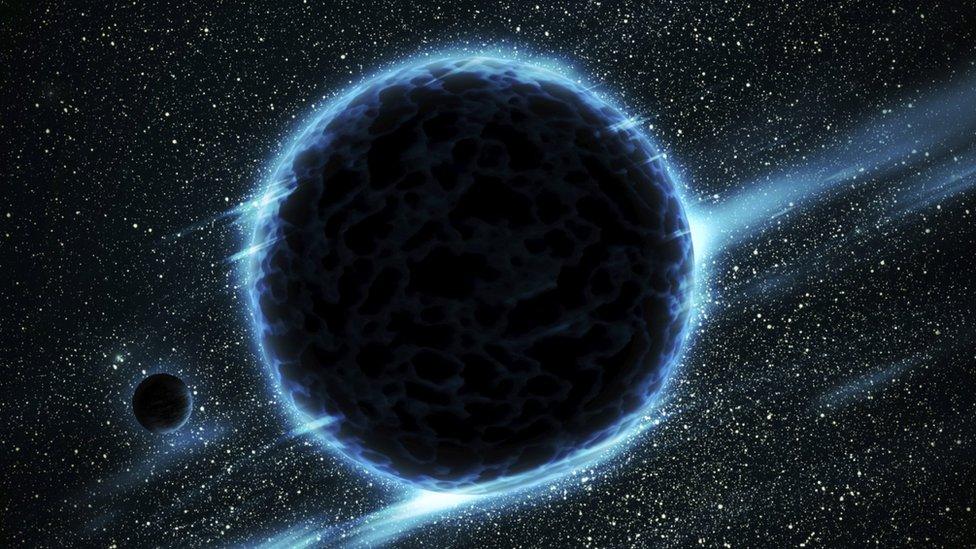
We have no idea if this is what Planet 9 is like
Good news: we're all not going to die (yet).
Some "news" reports have suggested a ninth planet (Planet 9) lurking at the edge of our solar system will soon be responsible for mass extinctions.
That's not true.
Firstly no-one has actually seen the planet yet. However scientists believe that it almost definitely exists, because they can see other objects in space being affected by it.
But we don't need to panic
You might have seen articles claiming that Planet 9's gravity could send asteroids from the Kuiper belt flying towards Earth and that this is what has caused mass extinctions in the past (and could again).
The Kuiper belt is a distant ring of bodies made up of things like ice, methane and rock.
Matthew Francis, a physicist and science writer tells Newsbeat: "This is unbelievably far out - in a literal sense.
"This is a planet way out in the solar system and what we're seeing is the effect of its gravity moving around these small icy bodies"
"Apart from the extinction of the dinosaurs we don't seem to have any evidence that mass extinctions throughout the history of the Earth are caused by large impacts like you get from a comet or asteroid."
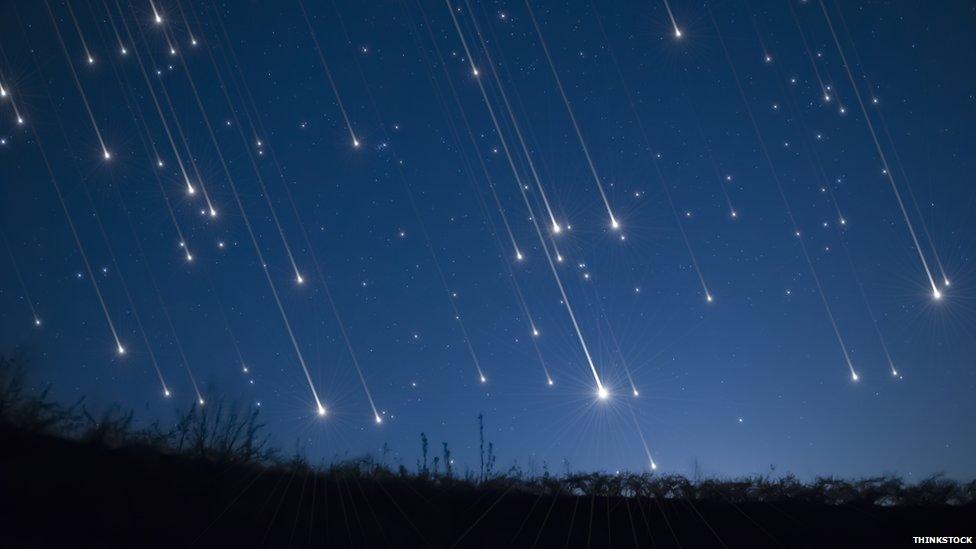
This is not Planet 9's fault
In fact the extinction of the dinosaurs by asteroid, though sounding dramatic, isn't even the biggest mass extinction in history anyway.
"The release of trapped gasses in Siberia [not from space] caused the largest mass extinction in history".
Matthew thinks some reports are getting confused with an old discredited idea (the Nemesis theory).
This was when scientists put forward the idea that a huge star orbiting the Sun could, through its gravity, affect objects from the far solar system and throw them onto a collision course with Earth. Scientists thought this could explain a number of mass extinctions.
However so far no evidence has been found to suggest there even is a "death star" and Matthew says: Other mass extinctions had nothing to do with an impact and so the whole idea that there are periodic impacts doesn't seem to be a thing anyway."
So, no worries.
Professor Mike Brown is one of the scientists whose research suggests there is a ninth planet in the solar system.
Mike Brown: "Planet Nine is not going to cause the earth's destruction", external
Yes, his Twitter handle is @plutokiller. That's because he's the guy responsible for Pluto getting demoted from planet status.
Mike Brown: "Earth is going away no time soon", external
Awesome. Now that's cleared up, the real news today is that scientists at University of Bern in Switzerland have worked out what Planet 9 might be like.
The study has been accepted by the journal Astronomy and Astrophysics. Enjoy these facts while you celebrate the fact the Earth is going to survive the weekend.
Planet 9 is literally cool
About -227C in fact, according to scientists at the University of Bern.
Even though it has central heating
Scientists in Switzerland say it's heated from the inside. If it weren't for the planet's core giving off heat it would be around -263C.
To understand why that's significant we have to stop thinking in Celsius and start to think in Kelvin - a measurement of temperature used by space scientists. It starts at zero.
0K - "Absolute Zero" - is the point when molecules stop moving completely.
Planet 9 is 47K, but if it weren't for its core it would be 10K, meaning the majority of its thermal energy comes from inside the planet.
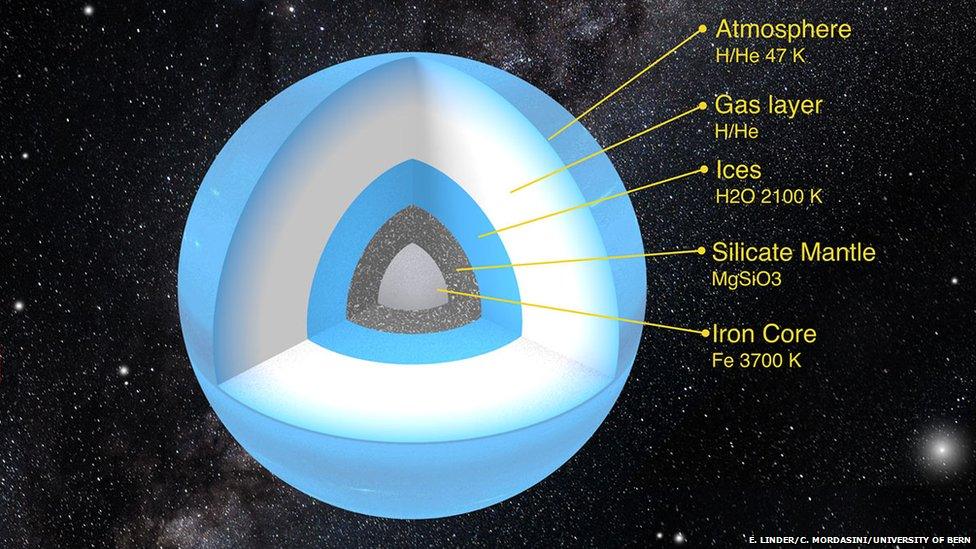
This is what Planet 9 could be made up of, according to scientists at the University of Bern
It boldly goes where no planet has gone before
The way it moves is very different to the other planets in the solar system.
Scientists in California say it's 20 times further from the sun than Neptune.
Planet 9's orbit is a lot wonkier than other planets. Its orbit is more elliptical (closer to an egg shape) as shown by the orange line below.
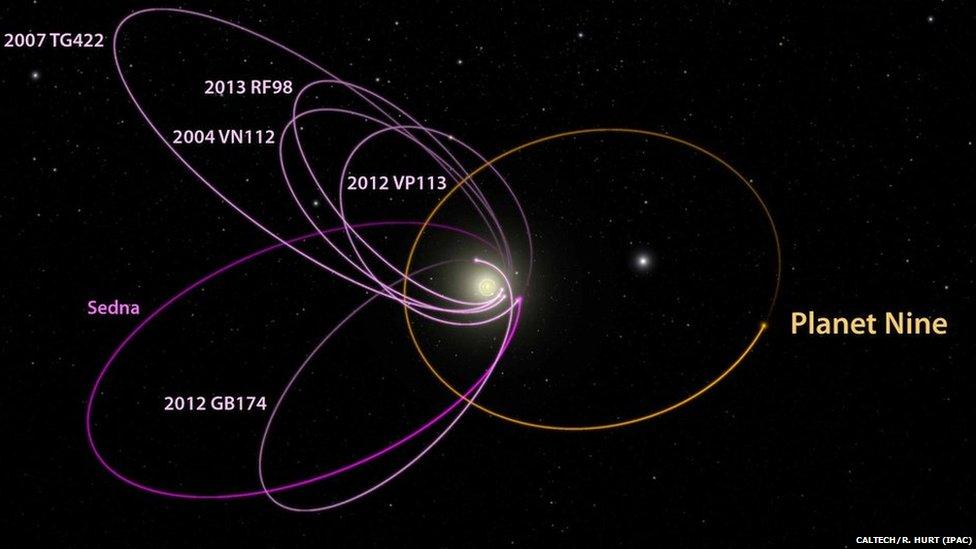
The purple lines are the six most distant known objects (not planets) in the Solar System with orbits exclusively beyond Neptune.
That means it is a lot closer to the sun at some points in its orbit than others
It's estimated it takes between 20,000 and 40,000 years for it to go around the sun. So a 'year' on Planet 9 lasts much longer than a lifetime.
It's hiding
OK it's a planet, it can't actively hide.
Nobody has seen it though. It's the way other objects closer to Planet 9 are seen to move that scientists in California say is evidence it exists.
The Caltech astronomers have a vague idea where it ought to be in the sky, and are hoping someone will track it down.
"There are many telescopes on the Earth that actually have a chance of being able to find it" said Prof Mike Brown.
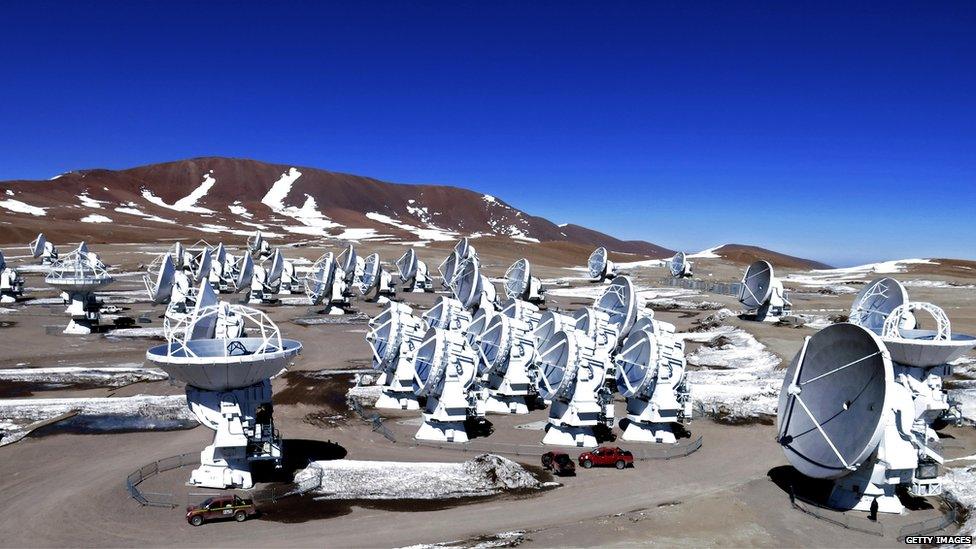
The ALMA observatory in Chile. Maybe someone here will track down Planet 9?
There is one potential sighting though - last month a new object in the Kuiper belt was spotted by a huge telescope in Hawaii on a very eccentric (or unusual) orbit.
This world - given the provisional name uo3L91 - was "exactly where Planet Nine says it should be", according to Prof Mike Brown.
It's well-travelled
Planet 9 could have formed in another solar system. Alexander Mustill from the Lund Observatory in Sweden and colleagues have suggested it could be what's known as an exoplanet - meaning it formed around a nearby star before being stolen by our Sun's gravity.
That's one theory - another is that it was the core of a gas giant that was ejected from the inner solar system early in its formation.
It's really big
About 7.5 times the diameter of Earth and ten times the mass, if the research is accurate.
That's still smaller than Jupiter though - it's been compared to ice giants Uranus and Neptune.
We think Jupiter is awesome too though.
And Pluto, if you're reading this, you'll always be Planet 9 in our hearts.
Find us on Instagram at BBCNewsbeat, external and follow us on Snapchat, search for bbc_newsbeat